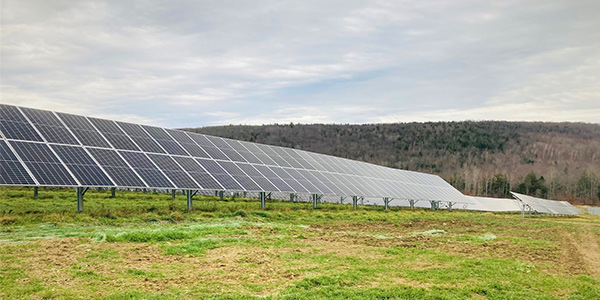Maine regulators are moving forward with a formal investigation of Central Maine Power’s distributed generation interconnection practices.
The decision came after a preliminary review of recent interconnection studies did not resolve concerns raised by the Coalition for Community Solar Access and the Maine Renewable Energy Association, Chairman Philip Bartlett said during a Public Utilities Commission meeting Tuesday.
The two nonprofits called for the investigation in February, claiming CMP was jeopardizing as much as 540 MW of clean energy by reneging on costs set out in current interconnection agreements.
“Being able to interconnect projects — and rely on any cost upgrade estimates from CMP — is an important step toward being able to get a project financed, and then ultimately built and reaching commercial operation,” Jeremy Payne, executive director of MREA, told RTO Insider.
The state has seen an overwhelming response to 2019 laws designed to promote renewable energy development, according to CMP spokesperson Catharine Hartnett.
There has been a “dramatic influx of solar development … resulting in 600-plus requests to interconnect over 2,000 MW onto CMP’s distribution network — 300 MW more than our system peak load now — in less than two years,” she told RTO Insider, adding that the influx has “created significant technical challenges for developers and utilities alike.”
While the interest in solar “is great news for achieving Maine’s climate policy objectives,” Hartnett said, “such transformational changes must be managed with careful and timely study and proper execution to ensure the continued safe and reliable service to our customers.”
CMP, she said, is committed to Maine’s clean energy future and will fully cooperate with the commission’s investigation.
Investigation Scope
The investigation will address, among other things, whether CMP’s efforts to identify issues related to potential DG islanding situations was timely and if its response to its findings was appropriate.
Islanding occurs when a DG facility continues to provide power to customers when electricity from the grid stops serving those customers. Without protection, overvoltage on un-faulted phases of the transmission circuit can damage customer and utility equipment, CMP said.
In response to a March 12 commission data request, the utility said that its understanding of possible islanding issues evolved during 2020. After an assessment of its current substation technology, CMP determined that “a significant number” of substations would need upgrades to properly detect overvoltage situations.
The costs for those upgrades are now affecting the system upgrade charges already established in existing interconnection agreements with developers.
In their Feb. 10 letter to the commission, the nonprofits said upgrade charges for the interconnection of a 2-MW solar project, for example, jumped from $239,000 to $12.2 million.
Bartlett said the commission’s investigation will determine whether CMP’s communications with developers about the costs were reasonable and whether the utility should be fined.
“We are pleased the commissioners unanimously agree that the severity of CMP interconnection errors and issues warrant a formal investigation,” Payne said. “In order to ensure these mistakes are not repeated, it is important we find out what happened, why it happened, and be sure there are processes put in place to avoid a repeat occurrence.”




